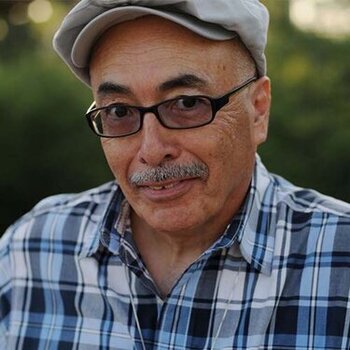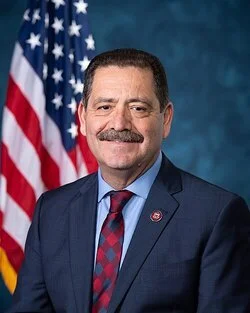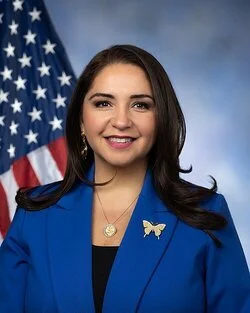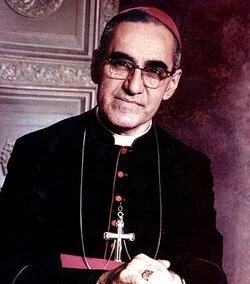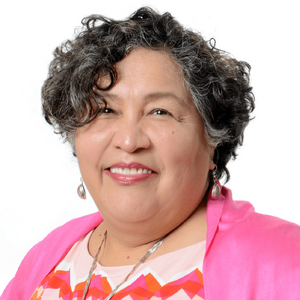Hispanic Heritage Month Spotlight Profiles
Community Renewal Society (CRS) celebrates Hispanic Heritage Month, which is observed annually from September 15 to October 15! Check out our spotlight profiles of influential Hispanic and Latine figures below.
Cesar Chavez (1927-1993)
A true American hero, Cesar Chavez was a civil rights, Latino and farm labor leader, a genuinely religious and spiritual figure, a community organizer and social entrepreneur, a champion of militant nonviolent social change and a crusader for the environment and consumer rights. Cesar’s career in community organizing began in 1952 when he was recruited and trained by Fred Ross, a legendary community organizer who was forming the San Jose chapter of the Community Service Organization (CSO), the most prominent Latino civil rights group of its time. Cesar spent 10 years with the CSO, coordinating voter registration and get-out-the-vote drives, leading campaigns against racial and economic discrimination and organizing new CSO chapters across California. Learn more.
Originally Published by Cesar Chavez Foundation
Julia Alvarez (1950-present)
Dominican American writer Julia Alvarez, 73, has been enchanting readers with her words since the early 1990s. She was born in New York City in 1950 before her family moved to the Dominican Republic when she was a baby. They stayed there throughout Alvarez’s childhood until her father’s involvement in a failed attempt to overthrow the militant dictator forced the family to flee to the United States in 1960. The traumatic event has since made its way into several of Alvarez’s works, including the poem “Exile” in which she recounts the night her family fled. She has become one of the most critically revered Latina writers and has published poems, novels and essays throughout her career. Learn more.
Originally Published by Biography.com
Sylvia Rivera (1951-2002)
A veteran of the 1969 Stonewall Inn uprising, Sylvia Rivera was a tireless advocate for those silenced and disregarded by larger movements. Throughout her life, she fought against the exclusion of transgender people, especially transgender people of color, from the larger movement for gay rights. In 1963, Rivera met Marsha P. Johnson and it changed her life. Johnson, an African American self-identified drag queen and activist, was also battling exclusion in a movement for gay rights that did not embrace her gender expression. The two were actively involved in the Stonewall Inn uprising on June 28, 1969 when patrons of the Stonewall Inn—a gay bar in Greenwich Village in lower Manhattan—rebuffed a police raid and set a new tone for the gay rights movement. For six nights, the 17-year-old Rivera refused to go home or to sleep, saying “I’m not missing a minute of this—it's the revolution!” Learn more.
Originally Published by the National Women’s History Museum
Juan Felipe Herrera (1948-present)
Juan Felipe Herrera was the 21st United States Poet Laureate from 2015-2017—the first Latino to be appointed to the post. The son of migrant farm workers in California, Herrera’s was a nomadic childhood. His mother recited poetry and taught him songs from the Mexican Revolution. Inspired by her spirit, he has spent his life, as The Washington Post put it, “crossing borders, erasing boundaries and expanding the American chorus.” Herrera’s political activism dates back to his college efforts to bring visibility to Mexican- Americans, and their stories and histories, as a member of the Chicano Civil Rights Movement. He continues his work as a performance artist and activist on behalf of migrant and indigenous communities and at-risk youth. Learn more.
Originally Published by Smith College
Antonia Novello (1944-present)
When Dr. Antonia Novello was appointed Surgeon General of the United States by President George Bush in 1990, she was the first woman—and the first Hispanic—ever to hold that office. Her appointment came after nearly two decades of public service at the National Institutes of Health, where she took a role in drafting national legislation regarding organ transplantation. Through the prestige and authority of this office, the Surgeon General can more effectively exhort and educate the public on pervasive health issues. As surgeon general, Novello focused on the health of young people, women, and minorities. She issued reports and spoke out on under-age drinking, smoking, drug abuse AIDS (especially among women and adolescents), childhood immunization and injury prevention, and improved health care for Hispanics and other minorities. Learn more.
Originally Published by the National Institutes of Health
Photo from Wikipedia
Jesús G. “Chuy” García (1956-present)
United States Representative Jesús G. “Chuy” García proudly represents the Fourth Congressional District of Illinois (IL). Congressman García has been a progressive voice fighting to improve the lives of his working-class neighbors, many of whom are immigrants like him. He is committed to empowering youth and expanding access to quality education, affordable housing, and economic opportunity. As Commissioner, he opposed housing discrimination against disadvantaged communities, raised the minimum wage, and mandated that county employees have access to paid sick leave. He also passed an ordinance ending Cook County's cooperation with the Immigration and Customs Enforcement Agency. Congressman García began organizing for workers’ rights and inclusive city services during his college years at the University of IL Chicago. He entered political life in 1984 when elected Committeeman of the Cook County Democratic Party. He quickly earned recognition as a coalition builder between Chicago’s Latino and African American communities. In 2015, Congressman García became the first Chicago mayoral candidate to push a sitting mayor into a run-off. Congressman García lives in the Little Village neighborhood with his beloved wife Evelyn and has three adult children. Learn more.
Originally Published by the United States House of Representatives
Photo from Wikipedia
Delia C. Ramirez (1983-present)
Former Community Renewal Society Deputy Director and the daughter of working-class Guatemalan immigrants, Congresswoman Delia C. Ramirez is an accomplished legislator, social service director, community leader, and coalition builder who has dedicated her life and career to advocating for working families. She proudly represents Illinois’ 3rd Congressional District as the first Latina elected to Congress in the entire Midwest. She currently serves on the Committee on Homeland Security and the Committee for Veterans Affairs. As the only member of Congress in a mixed-status family, she is leading the fight for comprehensive immigration reform and finally making a pathway to citizenship for Dreamers. Having spent nearly two decades in the nonprofit sector, Representative Ramirez understands the challenges working people face every day, which is why she is a staunch advocate of housing as a human right, healthcare for all, climate justice, and the fight to preserve and protect our democracy. Representative Ramirez’s commitment to her community was shaped by her experiences as a lifelong resident of Chicago’s Humboldt Park neighborhood. Representative Ramirez is a graduate of Northeastern Illinois University and lives in Chicago with her husband, Boris, and their golden retrievers, Lola and Milo. Learn more.
Originally Published by the United States House of Representatives
Photo from Wikipedia
Oscar Arnulfo Romero (1917-1980)
Archbishop Oscar Arnulfo Romero became the fourth Archbishop of San Salvador in 1977. Monsignor Romero spent over two decades as a parish priest and diocesan secretary in the city of his birth. He rose within the churches’ hierarchy to become the bishop of Santiago de Maria, a poor rural area in El Salvador, where he observed the suffering of El Salvador’s poor and experienced the increasing government-sanctioned violence against socially active priests and laypersons. In 1968, the region’s bishops decided to abandon the churches’ traditional role of supporting the status quo. Mon. Romero emerged as an outspoken critic of injustice and began broadcasting his sermons over the archdiocesan radio station. He gained a following, and people began to gather around radios to hear his message of humanity. He was not afraid to denounce El Salvador’s civil war and the accepted patterns of abuse. Mon. Romero’s campaign for human rights became a movement recognized internationally, and in 1979, he was nominated for the Nobel Peace Prize. Learn more, including about his influence on Centro Romero, a community-based organization that serves the refugee immigrant population in Chicago.
Originally Published by Centro Romero
Photo from The Chicago Network
Sylvia Puente (1958-Present)
Sylvia Puente is the former President and Chief Executive Officer of the Latino Policy Forum in Illinois (IL). Puente has earned a national reputation as a bridge builder and a trailblazer. She works tirelessly with nonprofit leaders, elected officials, and corporate partners to improve educational outcomes for children, to make housing more accessible and affordable while promoting just immigration reform, and building the influence and leadership of Latinos for the betterment of all of IL. Puente is a proud Chicago native who was introduced to her life’s work in advocacy, policy, and activism at the young age of 13, when she joined her mother on picket lines in support of the United Farm Workers union. Puente is regularly called upon to provide perspective on the implications of the nation’s changing demographics and is frequently cited in the media as an expert on Latino issues and has published numerous reports that articulate the vital role they play in society. Her 35-year career serving her community spans a wide range of experiences. Puente was selected by IL Governor Jay Robert Pritzker to serve on his transition team, the Educational Success Committee, which was tasked with tackling the state’s educational issues. Learn more.
Originally Published by The Chicago Network




